|
|
|
Sort Order |
|
|
|
Items / Page
|
|
|
|
|
|
|
| Srl | Item |
| 1 |
ID:
137727
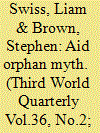

|
|
|
|
|
| Summary/Abstract |
The term ‘aid orphan’ refers to a developing country forgotten or abandoned by the development community. This metaphor has featured prominently in the development assistance policy and research literature over the past decade. Development practitioners, policy makers and researchers have defined aid orphans in manifold ways and often expressed concern over the potential fate or impact of such countries. In this paper we first examine the many definitions of aid orphans and then review the main concerns raised about them. Next we empirically examine more than 40 years of bilateral aid data to identify aid orphan countries and their common characteristics. Our findings suggest that very few countries meet the definition of aid orphan and fewer still raise the concerns collectively expressed about the orphan phenomenon. We conclude by suggesting researchers and practitioners abandon the orphan metaphor and instead focus on issues of equitable aid allocation.
|
|
|
|
|
|
|
|
|
|
|
|
|
|
|
|
| 2 |
ID:
108066
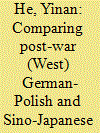

|
|
|
|
|
| Publication |
2011.
|
| Summary/Abstract |
The article argues that the harmonisation of national memories facilitates genuine reconciliation, while memory divergence resulting from national mythmaking hampers reconciliation. After World War II, Sino-Japanese and West German-Polish relations were antagonised by the Cold War structure, and pernicious myths prevailed in national collective memory. Then China and Japan brushed aside historical legacy for immediate diplomatic normalisation, but their reconciliation was impeded by elite mythmaking practices. Since the 1970s West Germany and Poland have de-mythified war history and engaged in historical settlement, paving the way for deep reconciliation after the Cold War.
|
|
|
|
|
|
|
|
|
|
|
|
|
|
|
|
| 3 |
ID:
097691


|
|
|
|
|
| Publication |
2009.
|
| Summary/Abstract |
Africa has many maritime interests, including trade and the use of its marine resources,
which it can use to support development on the continent. Unfortunately, these
resources are illegally plundered by others (illegal, unreported and unregulated fishing
is an example) and free trade is hampered by phenomena such as piracy and organised
crime. This is to the disadvantage of the people of the African continent. At the same time, little is being done in Africa to protect these interests and resources. The Common
African Defence and Security Policy pays little attention to the maritime dimensions in
addressing threats to peace, security and development. The African Standby Force, as an
instrument for the implementation of the policy, also does not address maritime forces
or the contribution they could make to African security and development. Africa needs
to become more maritime conscious and consider maritime matters at a continental and
sub-regional level and not only as national issues.
|
|
|
|
|
|
|
|
|
|
|
|
|
|
|
|
| 4 |
ID:
114561
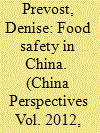

|
|
|
|
|
| Publication |
2012.
|
| Summary/Abstract |
The interaction between trade and health objectives has assumed critical importance for China since its accession to the World Trade Organization (WTO). The wish to improve its access to foreign markets has had a visible impact on China's food safety policy, providing significant impetus for far-reaching reforms. The WTO Agreement on Sanitary and Phytosanitary Measures (SPS Agreement), to which China is now bound as a WTO Member, sets out a "best practices" regulatory model with which national food safety regulation must comply. The disciplines it entails on regulatory autonomy in the area of food safety may present considerable challenges for China but have the potential to promote rationality in such regulation and to prevent food safety regulations that are based on unfounded fears or are a response to protectionist pressures from the domestic food industry. Faced with the possibility of challenges by other WTO Members to its food safety measures on the grounds of non-compliance with WTO rules, China has a strong incentive to improve conformity with this regulatory model, bringing benefits not only to exporters but most importantly to its citizens.
|
|
|
|
|
|
|
|
|
|
|
|
|
|
|
|
| 5 |
ID:
151489


|
|
|
|
|
| Summary/Abstract |
Based on a comparative case study of bilateral and multilateral donors, this article examines individual and institutional accountabilities among donor officers, implementing agencies, government officials and intended beneficiaries. It explores how multiple accountability demands interact, the extent to which they conflict, and how development actors mediate among them when they do. Institutionally there was substantial alignment of objectives and little goal conflict between international donors and the state; however, there was poor harmonisation across the many donors and numerous projects they were pursuing. There was greater variation within rather than between bilateral and multilateral donor chains, with perceived accountability differing more based on individuals’ positions within their organisation than by the type of organisation for whom they worked. Most informants cited multiple entities to whom they felt accountable. They more frequently acknowledged outward accountability when there existed formal accountability mechanisms, although intended beneficiary groups were conceptualised in different ways.
|
|
|
|
|
|
|
|
|
|
|
|
|
|
|
|
| 6 |
ID:
116931
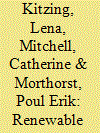

|
|
|
|
|
| Publication |
2012.
|
| Summary/Abstract |
Nations today are urgently challenged with achieving a significant increase in the deployment of renewable energies. In Europe that need has given rise to a debate about the most effective and efficient support strategy. Whilst the different interests debate whether full European harmonisation or strengthening of national support policies for electricity from renewable energy sources (RES-E) is the best way forward, individual national support schemes are rapidly evolving. This study investigates how the EU member states have applied support policy types over the last decade. By identifying predominant developments in the application of feed-in tariffs, premiums, tradeable green certificates, tax incentives, investment grants, and financing support for specific technologies (wind, biomass, PV), this study shows that Europe is currently experiencing certain tendencies towards a 'bottom-up' convergence of how national policy-makers design RES-E policy supports. While some outliers remain, the policy supports of most countries become more similar in the policy types applied (dominance of feed-in tariffs) and in their scope of implementation (differentiation for installation sizes and 'stacking' of multiple instruments). These trends in national decision-making, which show tendencies of convergence, could make an EU-driven 'top-down' harmonisation of support either dispensable or at least (depending on the agreement) less controversial.
|
|
|
|
|
|
|
|
|
|
|
|
|
|
|
|
| 7 |
ID:
153341
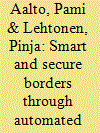

|
|
|
|
|
| Summary/Abstract |
The European Commission launched the “Smart Borders” policy process in 2011 to enhance border security in the European Union (EU) using technologisation and harmonisation. This includes the use of automated border control (ABC) systems. The Member States crucially shape the process, weighing security technologies and costs, privacy and rights, and further institutional choices. We examine the views of political stakeholders in four Member States by conducting a systematic empirical and comparative study unprecedented in the existing, political-theory-inspired research. In our Q methodological experiments, political stakeholders in Finland, Romania, Spain and the UK rank-ordered a sample of statements on Smart Borders, ABC and harmonisation. The factor analysis of the results yielded three main views: the first criticising ABC as a security technology, the second welcoming the security gains of automation and the third opposing harmonised border control. While impeding harmonisation, the results offer a consensus facilitating common policy.
|
|
|
|
|
|
|
|
|
|
|
|
|
|
|
|
|
|
|
|
|